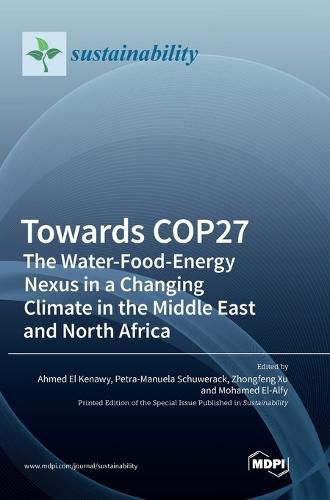Readings Newsletter
Become a Readings Member to make your shopping experience even easier.
Sign in or sign up for free!
You’re not far away from qualifying for FREE standard shipping within Australia
You’ve qualified for FREE standard shipping within Australia
The cart is loading…






This title is printed to order. This book may have been self-published. If so, we cannot guarantee the quality of the content. In the main most books will have gone through the editing process however some may not. We therefore suggest that you be aware of this before ordering this book. If in doubt check either the author or publisher’s details as we are unable to accept any returns unless they are faulty. Please contact us if you have any questions.
Due to its low adaptability to climate change, the MENA region has become a "hot spot". Water scarcity, extreme heat, drought, and crop failure will worsen as the region becomes more urbanized and industrialized. Both water and food scarcity are made worse by civil wars, terrorism, and political and social unrest. It is unclear how climate change will affect the MENA water-food-energy nexus. All of these concerns need to be empirically evaluated and quantified for a full climate change assessment in the region. Policymakers in the MENA region need to be aware of this interconnection between population growth, rapid urbanization, food safety, climate change, and the global goal of lowering greenhouse gas emissions (as planned in COP27). Researchers from a wide range of disciplines have come together in this SI to investigate the connections between water, food, energy, and climate in the region. By assessing the impacts of climate change on hydrological processes, natural disasters, water supply, energy production and demand, and environmental impacts in the region, this SI will aid in implementation of sustainable solutions to these challenges across multiple spatial scales.
$9.00 standard shipping within Australia
FREE standard shipping within Australia for orders over $100.00
Express & International shipping calculated at checkout
This title is printed to order. This book may have been self-published. If so, we cannot guarantee the quality of the content. In the main most books will have gone through the editing process however some may not. We therefore suggest that you be aware of this before ordering this book. If in doubt check either the author or publisher’s details as we are unable to accept any returns unless they are faulty. Please contact us if you have any questions.
Due to its low adaptability to climate change, the MENA region has become a "hot spot". Water scarcity, extreme heat, drought, and crop failure will worsen as the region becomes more urbanized and industrialized. Both water and food scarcity are made worse by civil wars, terrorism, and political and social unrest. It is unclear how climate change will affect the MENA water-food-energy nexus. All of these concerns need to be empirically evaluated and quantified for a full climate change assessment in the region. Policymakers in the MENA region need to be aware of this interconnection between population growth, rapid urbanization, food safety, climate change, and the global goal of lowering greenhouse gas emissions (as planned in COP27). Researchers from a wide range of disciplines have come together in this SI to investigate the connections between water, food, energy, and climate in the region. By assessing the impacts of climate change on hydrological processes, natural disasters, water supply, energy production and demand, and environmental impacts in the region, this SI will aid in implementation of sustainable solutions to these challenges across multiple spatial scales.